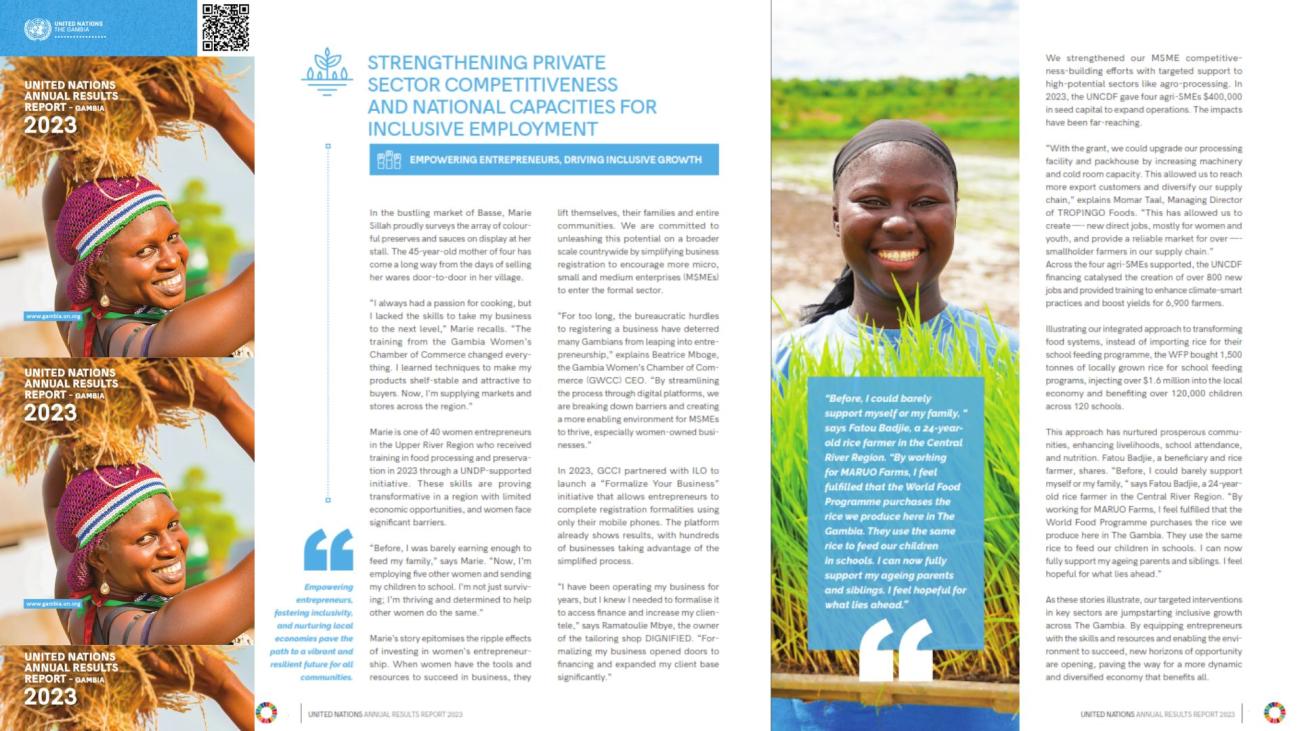EMPOWERING ENTREPRENEURS, DRIVING INCLUSIVE GROWTH
In the bustling market of Basse, Marie Sillah proudly surveys the array of colourful preserves and sauces on display at her stall. The 45-year-old mother of four has come a long way from the days of selling her wares door-to-door in her village.
“I always had a passion for cooking, but I lacked the skills to take my business to the next level,” Marie recalls. “The training from the Gambia Women’s Chamber of Commerce changed everything. I learned techniques to make my products shelf-stable and attractive to buyers. Now, I’m supplying markets and stores across the region.”
Marie is one of 40 women entrepreneurs in the Upper River Region who received training in food processing and preservation in 2023 through a UNDP-supported initiative. These skills are proving transformative in a region with limited economic opportunities, and women face significant barriers.
“Before, I was barely earning enough to feed my family,” says Marie. “Now, I’m not only providing for my children but sending them to school. I’m not just surviving; I’m thriving and determined to help my community do the same.”
Marie’s story epitomises the ripple effect of empowering women entrepreneurs. When women have the tools and resources to succeed in business, they lift themselves, their families and entire communities. We are committed to unleashing this potential on a broader scale countrywide by simplifying business registration to encourage more micro, small and medium enterprises (MSMEs) to enter the formal sector.
“For too long, the bureaucratic hurdles to registering a business have deterred many Gambians from leaping into entrepreneurship,” explains Beatrice Mbooge, the Gambia Women’s Chamber of Commerce (GWCC) CEO. “By streamlining the process through digital platforms, we are breaking down barriers and creating a more enabling environment for MSMEs to thrive, especially women-owned businesses.”
In 2023, GCCI partnered with ILO to launch a “Formalize Your Business” initiative that allows entrepreneurs to complete registration formalities using only their mobile phones. The platform already shows results, with hundreds of businesses taking advantage of the simplified process.
“I have been operating my business for years, but I knew I needed to formalize it to access finance and increase my clientele,” says Ranatoulibe Mbye, the owner of the tailoring shop DIGNIFIED. “Formalizing my business opened doors to financing and expanded my client base significantly.”
We strengthened our MSME competitiveness-building efforts with targeted support to high-potential sectors like agro-processing. In 2023, the UNCDF gave four agri-SMEs $400,000 in seed capital to expand operations. The impacts have been far-reaching.
“With the grant, we could upgrade our processing facility and packhouse by increasing machinery and cold room capacity. This allowed us to reach more export customers and diversify our supply chain,” explains Momar Taal, Managing Director of TROFINGO FOODS. “This has allowed us to create — new direct jobs, mostly for women and youth, and provide a reliable market for over 50 smallholder farmers in our supply chain.”
Across the four agri-SMEs supported, the UNCDF financing catalysed the creation of over 800 new jobs and provided training to enhance climate-smart practices and boost yields for 9,600 farmers.
Illustrating our integrated approach to transforming food systems, instead of importing rice for their school feeding programme, the WFP bought 1,500 tonnes of locally grown rice for school feeding programs, injecting over $1.6 million into the local economy and benefiting over 120,000 children across 120 schools.
“This approach has nurtured prosperous communities, enhancing livelihoods, school attendance, and nutrition,” says Fatou Badjie, a beneficiary and rice farmer. “Before, I could barely support myself or my family,” says Fatou Badjie, a 24-year-old rice farmer in the Central River Region. “By working for MARUO Farms, I feel fulfilled that the World Food Programme purchases the rice we produce here in The Gambia. They use the same rice to feed our children in schools. I can now fully support my aging parents and siblings. I feel hopeful for what lies ahead.”
As these stories illustrate, our targeted interventions in key sectors are jumpstarting economic growth across The Gambia. By equipping entrepreneurs with the skills and resources they need, promoting the formalisation of businesses, and investing in high-potential sectors, we are paving the way for a more vibrant and diversified economy that benefits all.









